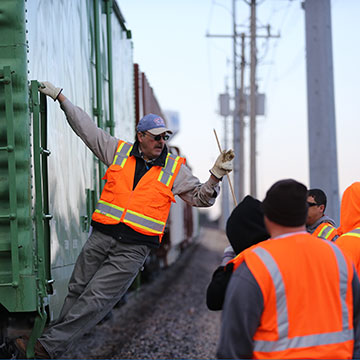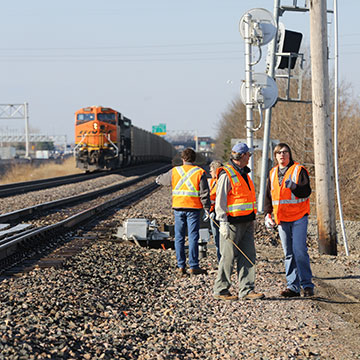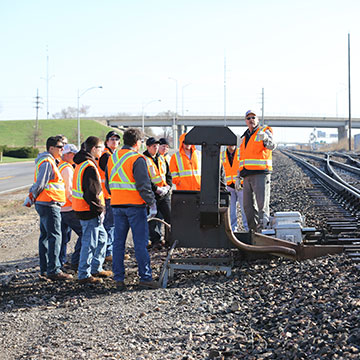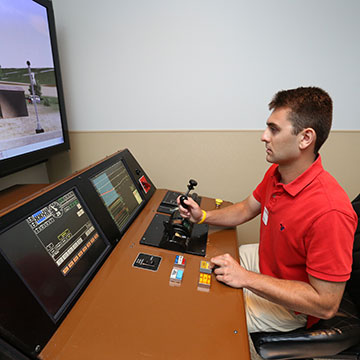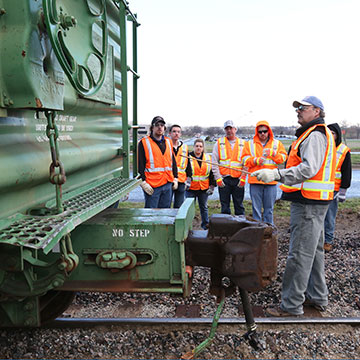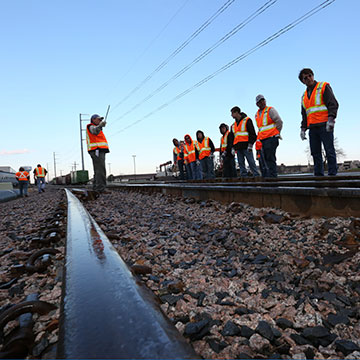The Railroad Conductor Certificate Program prepares you for an exciting and well-paying career as a railroad conductor.
Choosing a career in the railroad industry is a long-term commitment rewarded with an outstanding retirement system. On the road to that retirement goal, railroad employees enjoy comfortable wages and a competitive benefits package.
The more than 500 companies make up the United States railroad industry, providing the country's freight and passenger transportation service on a network of about 300,000 route miles of track. Railroads employ a substantial workforce.
Are you trying to decide if the "railroad way of life" is right for you? Here are some factors to consider:
- Conductors work in all weather conditions.
- Railroad conductors are on call, unless they work a shift with set hours (usually yard jobs). They usually must report to work within two hours of receiving a call to work.
- Railroads operate 365 days per year, even on holidays.
- Railroad conductors should be physically fit because they will experience some days with higher-than-normal physical exertion.
- Most railroads are seniority-based (except for some short line railroads). As a new hire or an employee low on the seniority roster, you could be furloughed or laid off from time to time.
- Railroad conductors should be self-motivated. They perform many aspects of their duties without supervision.
- Railroad conductors should be punctual, honest, and loyal to their employer.
Each railroad has somewhat different expectations for its employees, but the above observations are a good starting point to determine your fit in a railroad career. There are seven Class I railroads and more than 500 short line railroads in the United States. The employment potential is there based on your personal situation and desires.
Individual railroads can differ somewhat in the qualification requirements for applicants; most of them will not accept color-blind applicants. Railroads usually make applicants who advance in the hiring process pass a medical evaluation. Research the specific application requirements for the railroad to which you are considering applying.
Below are some of the general requirements of railroads, but you should consult specific railroads for their requirements.
You must pass a background check and an aptitude test as part of the railroad hiring process.
This may include:
- Your Social Security Number
- Criminal and drug history
- Past employment
- Education
- Professional licenses and certifications
- Military history
- Driving record
- Credit history
- Any other information relevant to the job
To judge whether you can perform the essential tasks of the position, you must complete a:
- Medical history questionnaire
- Color vision exam
- Physical ability test
- Urine drug test
- Medical screening
You must also be able to prove that you are a U.S. citizen or that you are authorized to work in the United States.
Preferred qualifications
- Outside work experience
- Experience working on an on-call basis
- Experience working varying shift schedules
- Experience operating heavy equipment
- Mechanical experience
- Must be at least 18 years old
- Possess a high school or general education diploma (GED)
- Ability to lift 75 lbs.
- Valid driver's license
- Pass hearing and vision requirements. Applicants cannot be color blind.
- 2 years of verifiable work experience and/or college
Physical requirements
- Medium to heavy work, lifting up to 50 pounds occasionally and up to 83 pounds on a rare basis
- Stoop/bend/kneel/crouch/crawl/balance/climb
- Work in cramped, confined, enclosed or awkward places
- Ride on the outside of rail equipment for long periods of time
- Walk long distances over uneven terrain
- Demonstrate auditory and visual acuity/tracking/inspection
- Meet color vision requirements as described in the Federal Railroad Administration (FRA) regulations
Basic competencies
- Verbal comprehension (Understand oral and written communications - both general and technical)
- Communication skills (provide clear instructions/directions)
- Reasoning skills (problem-solving and troubleshooting skills)
Personal characteristics
- Possess a reliable and safety-conscious attitude
- Ability to work in all weather conditions
- Possess strength and alertness
- Ability to follow rules and procedures
- Organized and detail-oriented
- Ability to work well independently or with a team
Typical conditions of employment
- Work safely to prevent on-the-job accidents and injuries
- Wear protective equipment including hearing protection, safety-toe boots or safety glasses
- Work hours may include a nonstandard work week, overtime and various shift work, including on-call 7 days a week, 24 hours per day, with extended periods of time away from home and short rest between assignments in accordance with the regulation on hours of service
- Work hours are based on seniority. New hires will work primarily nights, weekends and holidays.
- Must be able to report to work safely with two-hour notice
- Complete annual training and pass safety operating rules examination
- Federal regulations require random testing for drugs and/or alcohol
- Must pass all required assessments
- Must pass a background screening
- There is a strict disciplinary policy regarding inability to report to work within proper time frame or failure to accept a call for work
- Advance to engineer position when required, based on seniority
- Some positions are governed by a collective bargaining agreement. Membership is required.
- Must pass a post-offer medical examination, including drug and physical capabilities test that entails a 1.5 hour strength and cardiovascular fitness test. You will be required to travel up to 4 hours to a testing center, at your expense.
Career prospects in the railroad industry
The U.S. Department of Labor compiles statistics on the careers involving railroad science. You'll find information specifically related to careers in Kansas, including projected job openings and salary ranges.
- Locomotive Engineers
- Railroad Conductors and Yardmasters
- Railroad Brake, Signal, and Switch Operators
- Rail-Track Laying and Maintenance Equipment Operators
You can also find employment projections and salary information at the Power BI Post Graduate Report.

